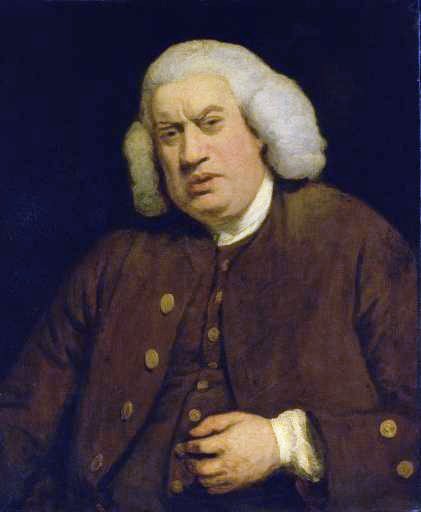**Our assignment was either to write a dull essay, or to emulate the style of Samuel Johnson in his dense yet ardent praise of William Shakespeare. Alone among my classmates, I chose the latter.**
That admiration in gratuitous excess is given to writers because of fame, and that awards are often due only to the adulation of the crowd, is a complaint loudly to be blogged by those who, being able to write nothing original of their own, strive for fame from the cruelty of bad reviews; or those who, being goaded by failure into a life of ineffectual Tweeting, are given to seek from Trolls what the thoughtful public denies them, and console themselves with page hits and Facebook likes while pining always for legitimate regard, which is only conferred upon true talent.
The Writer whose work I have been honored to introduce is even now assuming the status of one of the greats of all time, and may claim for himself the privilege of undeniable fame and literary and artistic influence. The references he makes use of in his work are of our own time, derived from both the immediate and the obscure, have the effect of Beautifying rather than obscuring the drama. The effects of his influence are felt among both friends and enemies in his ability to crash a server or mobilize millions into charitable acts, and yet he uses this power only for good; neither exposing laughable hubris nor targeting those who have wronged him. Thus, unmotivated by the petty or the pejorative, he exemplifies honor in his every endeavor, elevating him from mere writer to a kind of modern saint.
But human judgment is fickle and always looking for the next big thing, never fails to recognize a talent of this magnitude; and fame, though most profitable, may yet be the result of novelty or trend, it is important to specifically enumerate the seminal contributions Neil Gaiman has made to earn the favor of English-speaking audiences all over the world.
Gaiman is above all other writers, at least above all other writers working in English, the writer of whimsy; the man injects magic into every facet of his readers’ Experience. His characters are not foreign to readers despite their otherworldly qualities; by the humanity of his characterizations they are made to be just like us, but more. These are the offspring of Talent and Hope such as the world holds in short supply and the childlike imagination will always find. His characters act and speak at the same Promptings by which all people are motivated and the sound principles that keep the whole system of fiction cohesive and coherent. In the work of other writers a character is often a mystifying two-dimensional archetype; Gaiman creates a species we can believe in, or fall in love with.
It is occasionally objected from many a stiff-necked adult that the creations of Gaiman are too fanciful, too unreal, and too fantastical to be believed. Imagination is a series of commitments, with no other than Faith to sustain it, independent of reason but still subject to it. It is not always easily distinguishable from reality. There is no nearer approximation of the feeling of filial alienation through emotional distance than in Coraline. There is a greater understanding of the concept of sacrifice and the malleability of time in American Gods than may be gained from any more Sober fictions. The great gift of Fantasy is that it may explore our Nature without limits.
Through all these denominations of Story, Gaiman’s method of composition is constant; an impeccable balance of whimsy and concrete relationships, by which the mind is entranced by one and at the same time delighted by the other. But whatever be his medium, whether screenplay for Doctor Who or children’s board book, whether he intends to amuse or illuminate, he never fails to attain his goal; as he compels us, we laugh or despair, or sit stunned in absolute wonder with our minds blown, stripped of all our worldly indifference.
When Gaiman’s work is fully understood, most claims that his fame is a meaningless heaping of cultish praise cannot stand. It is unthinkable to me that such a writer should need my introduction; that his work could be unknown to any significant number of people or that his contributions should want defense. But it is hopeless to assume that every writer that should be known and universally acclaimed will be. After all, fame must continue in the way of all things and may someday altogether diminish; in which case such a recommendation, even from one such as I, may stand to speak for that which has been lost to time, suffered in the negligence of publishers, or his sentiments or style passing out of fashion. Let the critics of the next age argue over whether his work has stood the test of time; I hope they find my introduction a reason to take Gaiman’s work seriously.
Among the innumerable candidates for inferior Fame, I am willing now to stand in public judgment; and I wish that I could confidently assert that the quality of my introduction was anything close to equal to the work for which it must stand. Every work of preface, review, or commentary is by its nature supplemental and small, and I can take a little comfort in that sentence, if it is read and understood by people who really get the work of Neil Gaiman.



